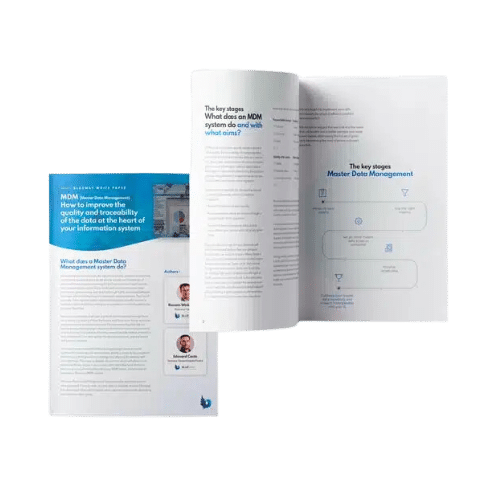Data management issues and methods: lifecycle, data quality, consistency, compliance, traceability, security, data integrity… set up effective governance with Master Data Management (MDM).
This content on MDM software and tools is part of our dossier on Master Data Management.
Golden data management has become a strategic issue for organizations. The lifecycle of data, from creation to archiving, must be rigorously supervised to guarantee its integrity. Data quality is crucial for reporting, while the consistency of information across systems ensures the reliability essential to day-to-day business. What’s more, data traceability is essential not only for legal compliance, but also to reinforce customer confidence by showing that their information is being properly managed. To meet these challenges, Master Data Management (MDM) solutions play a key role in centralizing and harmonizing critical data, enabling effective governance.
Data, whether structured or unstructured, is the driving force behind decision-making, innovation and the digital transformation of any organization. With good data governance, companies can significantly improve the reliability of their data. In so doing, it also improves decision-making, optimizes operations, customer experience, regulatory compliance and data protection. Effective management of this precious resource must be seen as the master asset that enables organizations to achieve their strategic objectives, while remaining competitive in a constantly evolving environment.
Ensure data quality, uniqueness and traceability
Get a 360° view of your data assets
Manage the data lifecycle efficiently
Apply your own business rules
Improve safety by centralizing all reference data
It’s essential to implement robust traceability and security measures. This will track and record all interactions with data, ensuring auditability and compliance with standards such as RGPD. Data Governance solutions offer functionalities for defining and applying security policies, managing access and monitoring activities in real time.
To respond effectively to the challenges of data management, it can be useful to appoint “data leaders”, such as a Chief Data Officer (CDO), and form a dedicated data governance team. This team will be responsible for defining data management policies, ensuring compliance, and monitoring data quality and security. This team can also organize training courses to explain key concepts such as data quality, security and regulatory compliance, ensuring that everyone in the organization understands their role in data management.
How can we orchestrate the different facets of data management to get the most out of it? Too often, these dimensions are treated in silos, limiting their synergistic potential. Yet it is essential to think of data management holistically, building bridges between the various key disciplines: Master Data Management (MDM), Enterprise Service Bus (ESB), Data Catalog, API Management (APIM) and Business Process Management (BPM). Adopting such an approach to data management is not without its challenges, however. You need to define a clear strategy, choose the right tools and involve all stakeholders. But the potential benefits are considerable: better data governance that resonates with increased agility.

With Data Governance, Phoenix’s MDM (Master Data Management) module, you can quickly model your data repositories, define data quality criteria, automatically generate user GUIs and acquisition/exposure WebServices, and begin data integration work.
What’s more, you can easily model your data repositories within a No Code interface. Then you define the data management and data quality rules to be applied: the platform then automatically generates all form screens and GUIs for end users and data stewards, as well as webservices for data acquisition and exposure to the rest of the information system.
for data integration and process management.
of data repositories.
of data flows.
in one place.
data control and deduplication.
At Blueway, we’re convinced of the importance of data management and governance. That’s why our modular Phoenix platform has no limitations when it comes to the databases hosting your repositories: SQLServer, DB2, Oracle Postgres, … What’s more, thanks to customizable portals, you can easily manage data lifecycles, traceability, deduplication, trans-coding… What’s more, the Data Governance module is fully integrated with the Data Foundation foundation (data transport and manipulation) as well as with the Process Governance module (workflow and human processes).